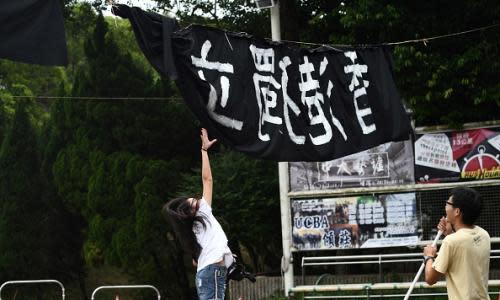Academic freedom at risk at Hong Kong's universities, says report

Hong Kong’s universities, long a beacon of academic freedom, bastions of freewheeling activism and discussion, are under threat and risk losing their internationally respected status, according to a report.
Universities are increasingly limiting freedom of expression, outspoken professors have been removed from their posts and government-appointed administrators run the schools against the will of the students and staff, Kevin Carrico, a professor at Macquarie University in Australia, writes in a report for the NGO Hong Kong Watch.
It focuses on the developments in the past two years, after watershed street protests where students occupied main thoroughfares for 11 weeks while calling for greater democracy.
Students at several Hong Kong universities were admonished last year for posting banners that called for the city to declare independence from China, with all 10 university heads issuing a joint statement saying “freedom of expression is not absolute”. The government suggested such sentiments were illegal.
Peter Mathieson, the incoming vice-chancellor of Edinburgh University who is currently at the University of Hong Kong, was heavily criticised by staff for his role in the debate.
“By placing arbitrary and clearly political limits on the exercise of speech rights, Hong Kong’s government and universities are undermining Hong Kong’s longstanding rule of law and opening the door for ever greater restrictions on speech,” the report said.
“These universities are in fact compromising their distinctiveness from universities elsewhere in China and thereby actively abandoning their own competitive advantages as world-class research centres.”
The report comes as the House of Commons and the House of Lords prepare to debate issues of democracy and autonomy in Hong Kong.
The report was released by Hong Kong Watch, founded after a British human rights activist was denied entry to the city without reason. The author, Carrico, teaches modern Chinese history and is researching political movements in Hong Kong.
The UK handed Hong Kong back to China in 1997 and the territory was allowed to maintain freedom of expression, a right unheard of in mainland China, and a separate education system.
Academic freedom has deteriorated to such an extent that independent monitoring groups should be established to monitor universities, the report says, while “universities around the world should provide shelter for academics pressured out of their positions”.
The report also calls on the UK government to “actively monitor the situation, and state clear consequences ...for continued infringements of academic freedom and freedom of speech”. The UK produces a biannual report on Hong Kong’s status as part of the treaty with China transferred sovereignty of the city.
The role of Hong Kong’s chief executive as the head of all the city’s universities, a holdover from the British colonial period, should also be abolished, returning control to the universities, the report recommends.
The Hong Kong government did not respond to requests for comment.

 Yahoo News
Yahoo News 